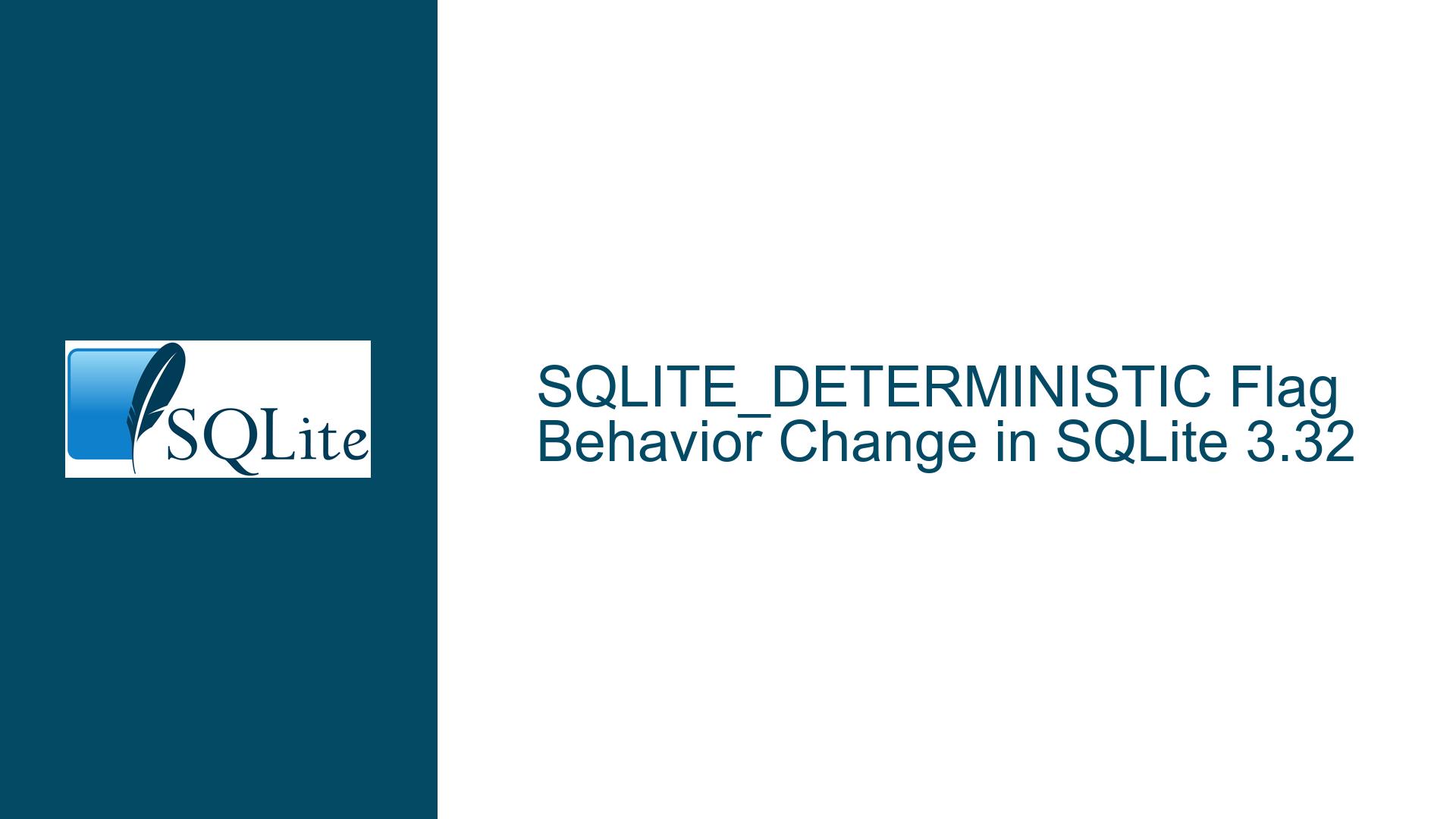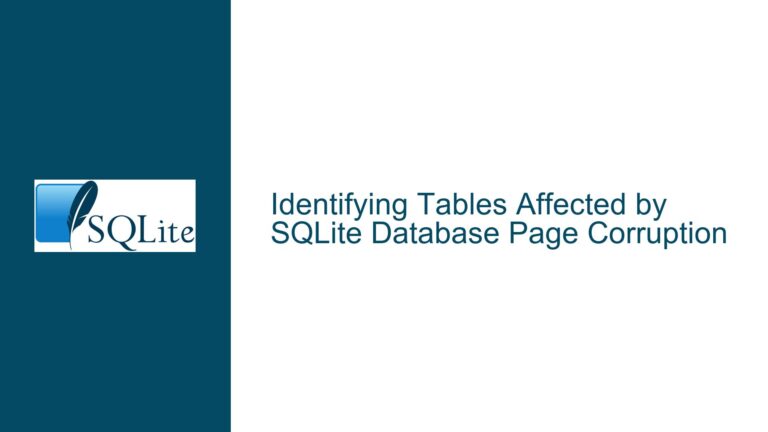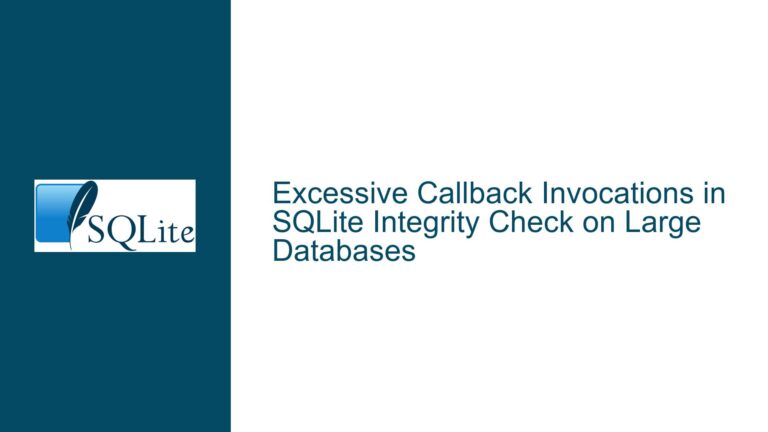SQLITE_DETERMINISTIC Flag Behavior Change in SQLite 3.32
Deterministic Function Invocation Changes in SQLite 3.32
In SQLite 3.32, a significant change was introduced regarding the behavior of deterministic functions, particularly those marked with the SQLITE_DETERMINISTIC flag. Prior to this version, deterministic functions with constant arguments were often optimized to be executed only once during the preamble of a prepared statement, with their results reused throughout the query. However, starting with SQLite 3.32, deterministic functions may be invoked multiple times, even when they appear multiple times in the same SQL statement with constant arguments. This change has led to confusion among developers who rely on the SQLITE_DETERMINISTIC flag to ensure that their functions are executed only once.
The SQLITE_DETERMINISTIC flag is used to indicate that a function will always return the same output given the same input. This flag is crucial for enabling the use of such functions in contexts like partial indexes and generated columns, where the function’s determinism is a prerequisite. However, the flag does not guarantee that the function will be executed only once per query. The change in SQLite 3.32 was introduced to fix a bug related to integer overflow errors in certain queries, but it also altered the expected behavior of deterministic function invocations.
For example, consider the following query:
SELECT deterministic(), deterministic() FROM t1;
In SQLite versions prior to 3.32, the deterministic() function might have been executed only once, with its result reused for both invocations. However, in SQLite 3.32 and later, the function could be executed twice, once for each appearance in the SQL statement. This behavior is a side effect of the fix for the integer overflow bug and is not a guarantee of future behavior. The SQLite query optimizer may choose to invoke the function more or fewer times depending on its internal logic.
Interrupted Write Operations Leading to Index Corruption
The change in the behavior of deterministic functions in SQLite 3.32 was primarily motivated by a bug that caused integer overflow errors in certain queries. Specifically, the bug was related to the abs() function, which could trigger an integer overflow error even when the function was not actually used in the query. This bug was particularly problematic because it could cause queries to fail unexpectedly, even when the function in question was not relevant to the query’s logic.
The bug was rooted in the way SQLite optimized deterministic functions with constant arguments. Prior to version 3.32, SQLite would factor out such functions into the preamble of the prepared statement, executing them once and reusing their results throughout the query. However, this optimization could lead to issues when the function’s execution resulted in an error, such as an integer overflow. In such cases, the error would occur during the preamble, causing the entire query to fail, even if the function’s result was never actually used.
To fix this issue, SQLite 3.32 changed the way deterministic functions are handled. Instead of executing these functions in the preamble, SQLite now executes them only when they are first used in the query. This change prevents errors in deterministic functions from causing the entire query to fail prematurely. However, it also means that deterministic functions may be executed multiple times if they appear multiple times in the SQL statement, even if their arguments are constant.
For example, consider the following query:
SELECT coalesce(x, abs(-9223372036854775808)) FROM t1;
In SQLite versions prior to 3.32, this query could fail with an integer overflow error because the abs() function was executed in the preamble, even though its result was never used. In SQLite 3.32 and later, the abs() function is only executed if it is actually needed, preventing the integer overflow error from occurring unnecessarily.
Implementing PRAGMA journal_mode and Database Backup
Given the changes in SQLite 3.32, developers who rely on deterministic functions should be aware of the potential for multiple invocations of these functions within a single query. While the SQLITE_DETERMINISTIC flag still serves its primary purpose of enabling the use of deterministic functions in partial indexes and generated columns, it no longer guarantees that the function will be executed only once per query. Developers should adjust their expectations and test their code accordingly to ensure that it behaves correctly under the new behavior.
One way to mitigate the impact of multiple invocations of deterministic functions is to use the PRAGMA journal_mode setting to control how SQLite handles transactions and data integrity. The PRAGMA journal_mode setting determines how SQLite journals changes to the database, which can affect both performance and reliability. For example, setting PRAGMA journal_mode to WAL (Write-Ahead Logging) can improve performance by allowing concurrent reads and writes, while setting it to TRUNCATE or DELETE can reduce the risk of database corruption in the event of a power failure or other interruption.
In addition to adjusting the PRAGMA journal_mode setting, developers should also consider implementing regular database backups to protect against data loss or corruption. SQLite provides several mechanisms for creating backups, including the sqlite3_backup_init API and the .backup command in the SQLite shell. Regular backups can help ensure that data is not lost in the event of a failure, and they can also provide a way to recover from issues caused by changes in SQLite’s behavior, such as the changes to deterministic function invocation in version 3.32.
For example, consider the following SQL commands to set the journal mode and create a backup:
PRAGMA journal_mode = WAL;
.backup main backup.db
By setting the journal mode to WAL and creating regular backups, developers can improve the reliability and performance of their SQLite databases, even in the face of changes like those introduced in SQLite 3.32.
In conclusion, the change in the behavior of deterministic functions in SQLite 3.32 is a significant one that developers should be aware of. While the SQLITE_DETERMINISTIC flag still serves its primary purpose, it no longer guarantees that a function will be executed only once per query. Developers should adjust their code and testing practices accordingly, and consider using PRAGMA journal_mode and regular backups to improve the reliability and performance of their SQLite databases.






